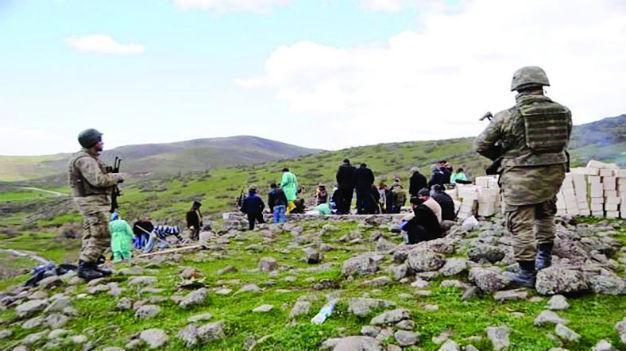Turkey in review 2015
ISTANBUL
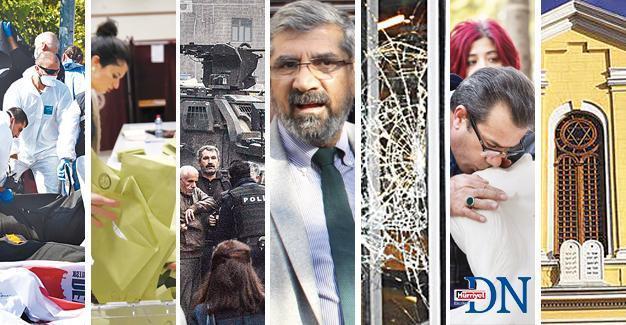 1) Kurdish issue evolves from peace process to terror fight
1) Kurdish issue evolves from peace process to terror fightThe Kurdish issue, one of the most violent problems in Turkey which has taken thousands of lives since the early 1980s, transformed from “peace process talks” into the “fight against terrorism” in Turkey’s southeast in 2015, with a large number of security forces, militants and civilians killed.
The year began with promising developments for a possible peaceful solution to the Kurdish problem. On Feb. 28, 2015, Abdullah Öcalan, the leader of the outlawed Kurdistan Workers’ Party (PKK) who is serving a life sentence in the island prison of İmralı island prison, urged the PKK to hold a congress in the spring to discuss disarmament in Turkey.
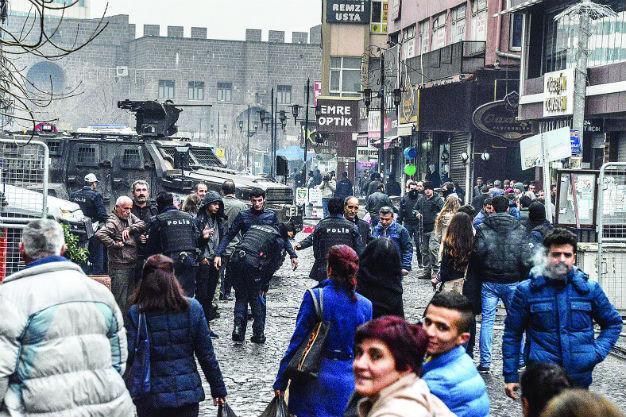
AFP photo
Öcalan issued his first call on the PKK to declare a cease-fire in 2013, while a joint press conference between the government and the Kurdish-problem-focused Peoples’ Democratic Party (HDP) was held at Dolmabahçe Palace in Istanbul on Feb. 28, 2015. Deputy Prime Minister Yalçın Akdoğan and HDP Istanbul deputy Sırrı Süreyya Önder read their own statements, while Önder listed 10 articles which summarized Öcalan’s priorities. However, in July 2015, President Recep Tayyip Erdoğan said he did not approve the meeting in Dolmabahçe. On July 20, 2015, a suicide bombing conducted by the Islamic State of Iraq and the Levant (ISIL) militants targeted a cultural center in the town of Suruç, a district in the southeastern Şanlıurfa province. A total of 33 activists were killed in the explosion.
The country woke up to a dark morning two days later on July 22, 2015, when two police officers were found dead in their houses in Şanlıurfa’s Ceylanpınar district. The PKK’s military wing claimed responsibility for the attack, saying that it was done “in revenge for the massacre in Suruç.” On Sept. 4, 2015, a curfew was announced in the Cizre district of southeastern Şırnak province, where operations were held against PKK militants until Sept. 12 when the curfew ended.
Minor clashes and even fatalities occurred in September, when an incident in the town of Dağlıca in southeastern Hakkari province shocked the country. On Sept. 6, some 17 Turkish soldiers were killed in a roadside bomb attack by PKK militants. Since August, the clashes shifted from mountainous rural areas to towns and city centers in the southeastern and eastern part of the country, with curfews marking a new era in the fight against the PKK. The first curfew was enforced in the Varto district of eastern Van province on Aug. 16, 2015. Curfews were enforced in 20 districts of seven cities at least 56 times throughout the year. In total, 253 days have been spent under curfew in these towns, according to a statement released by the HDP, which also stated that the death toll was 56.
The Cizre and Silopi districts of Şırnak and the historic district of Sur in Diyarbakır will enter 2016 under curfew. In Sur, it will be the 32nd day under curfew. The curfew was removed on one street of Sur on Dec. 30, while the rest of the district is still a scene of ongoing clashes under curfew. On Dec. 28, the Turkish army announced that some 214 PKK militants have been killed since Dec. 15.
2) Turkey starts anti-ISIL fight after worst-ever attacks
Turkey stepped up efforts in counterterrorism activities against the Islamic State of Iraq and the Levant (ISIL) across the country in 2015 following three major terrorist acts that were linked to the jihadist group.
Under pressure to beef up security measures against suspected ISIL militants following criticisms that it acted too slowly to recognize the threat of militant extremism, Turkish security forces launched anti-terror operations after bombings in Diyarbakır, Suruç and Ankara killed 139 people and sent shockwaves throughout the country, leaving hundreds of civilians dead and nearly 1,000 others wounded.
Bombs targeted a Democratic Peoples’ Party (HDP) rally on June 5, 2015, in the southeastern province of Diyarbakır, killing four people. On July 20, 2015, a suicide bombing conducted by ISIL member Şeyh Abdurrahman Alagöz targeted a cultural center in the southeastern town of Suruç, a district in Şanlıurfa province, as a group of volunteers from the Federation of Socialist Youth Associations (SGDF) prepared to set off for Kobane with toys for children affected by the ISIL assault on their town. Thirty-three activists died in the bombing, while 100 others were wounded.
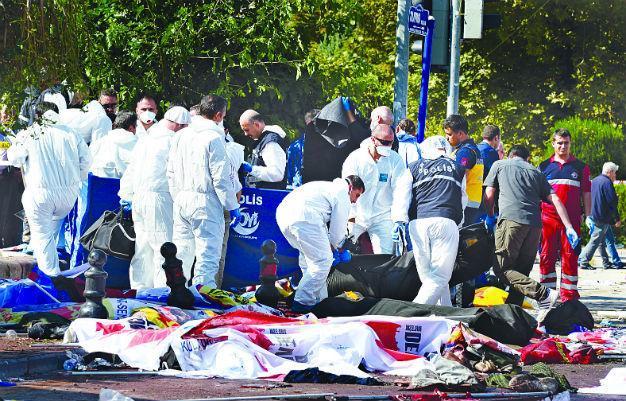
HÜRRİYET photo
More deaths were to occur on Oct. 10, 2015, when 103 civilians were killed in a double suicide bombing at the beginning of a peace rally in Ankara.
In October 2015, a teahouse in the southeastern province of Adıyaman was revealed to have been used as an ISIL cell to recruit militants. The biggest probe into ISIL activities in Turkey was completed in mid-December, with the country accusing 67 suspects of direct or indirect links to ISIL. An indictment in the case listed İlyas Aydın, 26, as the chief militant of the terrorist organization’s Turkey branch. Aydın called would-be jihadists to join ISIL on pro-ISIL social networks while he also delivered religious speeches in mosques and other holy places.
ISIL’s other main leader in Turkey was identified as Halis Bayancuk, a senior ISIL leader also known as “Abu Hanzala” based in Istanbul.
3) Turkish politics witnesses hectic year of elections
In 2015, the Republic of Turkey, having been founded in 1923 and with a multi-party system since the mid-1940s, held parliamentary elections for the 24th time on June 7. Unprecedentedly, voters returned to polling stations only five months later on Nov. 1.
Founded in August 2001, the ruling Justice and Development Party (AKP) won three consecutive parliamentary elections in 2002, 2007 and 2011 and was able to form a single-party government after each election.
However, in the June 7, 2015, election, the AKP dropped to fewer than 276 seats in parliament, the number needed for a legislative majority. It had aimed for the 330 seats needed in order to change the constitution without input from other parties and thus pave the way for a new presidential system.
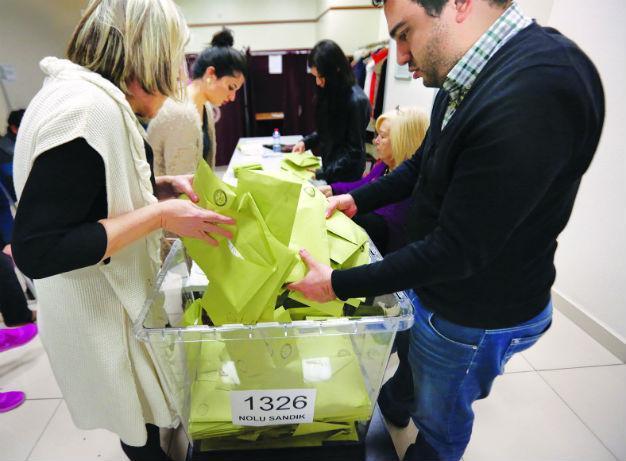
AP photo
It was July 9 when President Recep Tayyip Erdoğan finally commissioned AKP leader and incumbent Prime Minister Ahmet Davutoğlu to form a new government, thus setting the clock ticking on a 45-day period to succeed or face a new election.
Davutoğlu formally abandoned efforts to find a junior coalition partner for his party on Aug. 18. A 45-day deadline expired on Aug. 23 and it was Aug 24, when Erdoğan announced his decision to take Turkey to a reelection in November, as a first in Turkey’s history. The date for the early elections was set as Nov. 1.
In the meantime, Erdoğan came under fire from all opposition parties for not giving a new mandate to form the government to the Republican People’s Party (CHP), which received the second highest number of votes. The CHP, which held weeks of coalition talks with the AKP, said Erdoğan deliberately stymied the negotiations in the hope of triggering new polls and a better result for the AKP, of which he was the founding leader.
An interim cabinet was established and announced on Aug. 28 by Davutoğlu after Erdoğan assigned him to form a caretaker government to steer Turkey to a rerun of June’s general election.
In the June 7 vote, the AKP won 258 seats in the 550-seat parliament, followed by the CHP with 132. The Nationalist Movement Party (MHP) and the Peoples’ Democratic Party (HDP) each received 80 seats apiece. As such, the AKP failed to secure the majority in the 550-seat parliament required to rule alone compared to the previous elections in 2011 in which it won almost 50 percent of the vote.
In the Nov. 1 snap elections, the AKP, the CHP, the HDP and the MHP obtained 317, 134, 59 and 40 seats, respectively. For a constitutional change in parliament, the AKP needed to win 367 seats, though 330 seats would be enough to take the issue to a referendum. Through the redrafting of the constitution, the AKP hopes to change the country’s administrative system to an executive presidential system, though all opposition parties are fiercely opposed to this ambition.
Erdoğan’s rhetoric favoring a single-party government’s rule for “stability” was consistent over the five months between the two elections.
4) 2015 proves devastating for media freedom
The state of freedom of expression and the media in Turkey was devastating in 2015, with several journalists put behind bars. The Istanbul headquarters and Ankara premises of daily Hürriyet were pelted with stones and bats less than 24 hours apart from each other, on Sept. 6 and Sept. 8, causing material damage. Around a month later, Ahmet Hakan, Hürriyet columnist and host of a political debate program at private TV channel CNNTürk was attacked early Oct. 1 in front of his house.
On Oct. 28, Istanbul police used force to enter the headquarters and seize control of media outlets owned by the Koza İpek Group, dramatically breaking into the main broadcasting room and shutting down two TV stations, Kanaltürk and Bugün TV. The group was appointed caretakers who then prevented the printing of the Oct. 29 editions of dailies Bugün and Millet. Turkey ranked in a report as the fifth worst jailer of journalists globally in 2015, with 14 journalists currently behind bars in the country.
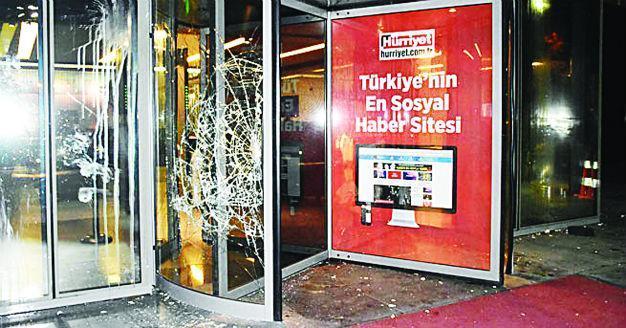
Daily Cumhuriyet Editor-in-Chief Can Dündar and the daily’s Ankara bureau chief, Erdem Gül, were put behind bars on Nov. 26 on charges of “aiding terrorist organizations” over their reports.
A number of journalists in Turkey have faced charges of “insulting” Turkish president. A local court decided on the confiscation of books by three prominent Turkish journalists, Hasan Cemal, Tuğçe Tatari and Müslüm Yücel.
5) Prosecutor killed by DHKP-C militants
Istanbul prosecutor Mehmet Selim Kiraz was killed on March 31 hours after he was taken hostage by two militants of the outlawed far-left Revolutionary People’s Liberation Party-Front (DHKP-C) at a courthouse in Istanbul’s Çağlayan neighborhood. Kiraz, 46, was taken hostage at Çağlayan courthouse, the largest in Turkey, and allegedly shot by his captors after six hours of negotiations. The two hostage-takers, who released photographs of Kiraz with a pistol to his head during the siege, were killed by security forces.
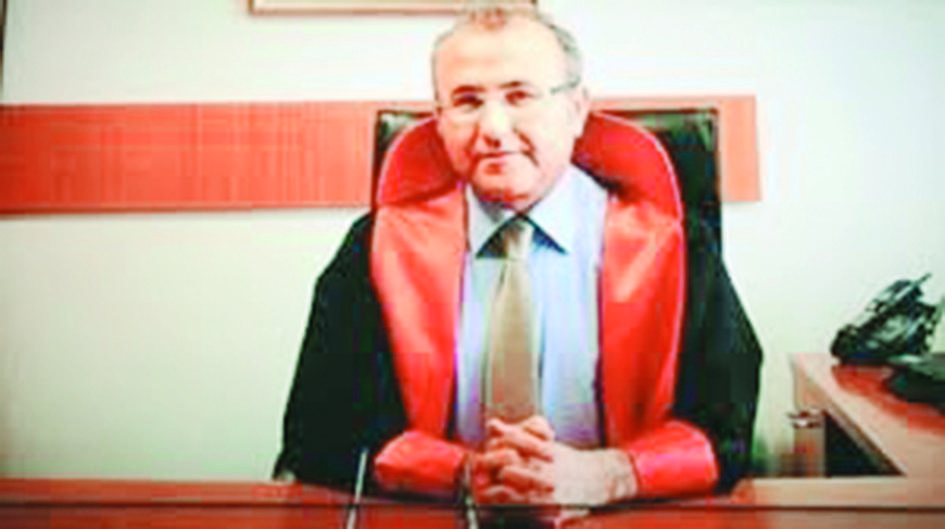
6) Rights lawyer Tahir Elçi shot dead in Diyarbakır
Prominent human rights lawyer and Diyarbakır Bar Association head Tahir Elçi was shot dead in the Sur district of Diyarbakır on Nov. 28, 2015, in clashes that erupted after gunmen killed two police officers in a nearby street.
Elçi was conducting a press statement to condemn ongoing operations that had damaged the base of Diyarbakır’s famous Four-Legged Minaret. Security forces have yet to conclude whether it was an assassination or whether he was killed in the crossfire during clashes between police and militants.
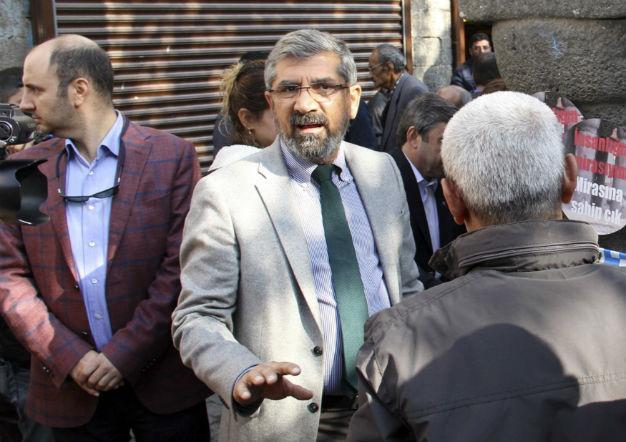
AFP photo
7) Violence against women skyrockets during 2015
Public debate around violence against women flared up in Turkey earlier this year, after the burned body of 20-year-old university student Özgecan Aslan was found in a river bed in the southern province of Mersin on Feb. 11, 2015.
The driver of the minibus she took to return home confessed to the murder and was arrested on Feb. 16 with two of his accomplices. The three men were sentenced to aggravated life in prison in a Dec. 3 ruling. The activists called the court ruling a victory because the judge did not reduce the sentences of the three suspects. Many male suspects have received lower sentences for murdering women on the grounds that they had a “positive” demeanor during their trials. Activists demanded the government change the law that says the sentence can be reduced based on a suspect’s demeanor during trial.
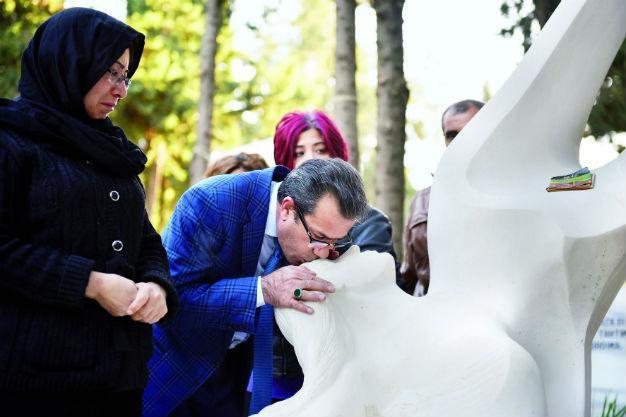
AA photo
A few months later, Turkey was again shocked by another murder in the Aegean province of Muğla. Cansu Kaya, 18, was found dead in a canal in the western province of Muğla last week.
Two male suspects, N.D. and M.P.Ç., are facing charges of aggravated life sentence for rape and murder of the young woman. Özgecan and Cansu were only two victims among some 270 women who were killed by men across the country during 2015.
In 2015, at least 270 women were killed according to reports released by media outlets, demonstrating a steady increase in recent years. In 2013, a total of 175 women were killed across Turkey. This number increased to 194 in 2014, according to data released by the former Family and Social Policies Minister Ayşen Gürcan in a recent statement.
In the first six months of 2015, the ministry’s centers to prevent violence has provided service to 34,429 women, 1,159 men and 9,726 children, the statement also revealed. The ministry owns 97 women guest houses with a capacity of hosting 2,603 people.
8) AKP-Gülen contention escalates
Contention between the Turkish government and the U.S.-based cleric Fethullah Gülen escalated in 2015, with innumerable police raids targeting alleged members of the parallel state working in the police, judiciary and media outlets.
President Recep Tayyip Erdoğan and his inner circle accuse Gülen of forming and heading a terrorist organization, “Fethullahist Terrorist Organization (FETÖ),” a “parallel state” created within government bodies aiming to topple the government.
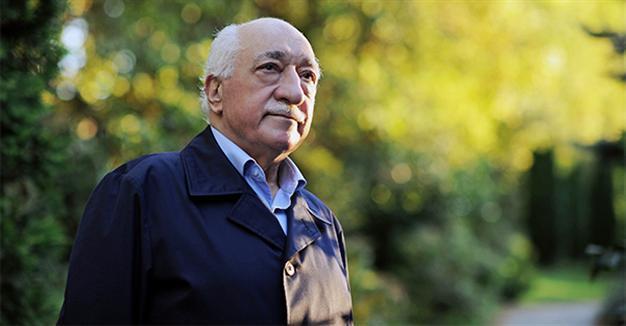
AFP photo
Police raids, which increased after the alleged organization was officially named this year, were conducted as part of investigations into the purported terrorist organization, targeting former lawmakers, current and former police officers, judiciary personnel, academics, businessmen, journalists and several media outlets. Legal procedures were implemented against hundreds for having links to Gülen and hundreds were detained on terrorism charges.
The operations agains Gülen started after the country’s biggest corruption investigation launched in late 2013, involving the sons of four former ministers and Erdoğan’s son, Bilal Erdoğan.
9) Alleged coup convicts cleared in ‘Balyoz’ case
A majority of alleged military coup convicts, mostly Turkish military veterans, were cleared in 2015 in what justices and prosecutors called the “Balyoz (sledgehammer) Case,” which was filed over an alleged military coup planned in 2003 to remove the Justice and Development Party (AKP) from the power.
In March 2015, 236 of the 365 suspects were acquitted in the Balyoz case that was filed over a controversial news report published on daily Taraf on Jan. 20, 2010, which claimed a military coup plan had been drafted in 2003 to topple the AKP government of the time. The court sentenced 325 suspects to life in prison in September 2012, with 234 of whom were released in June 2014. Upon the acquittal of the 236 people in 2015, several military veterans won cases they filed to receive compensation for the time they served in prison.
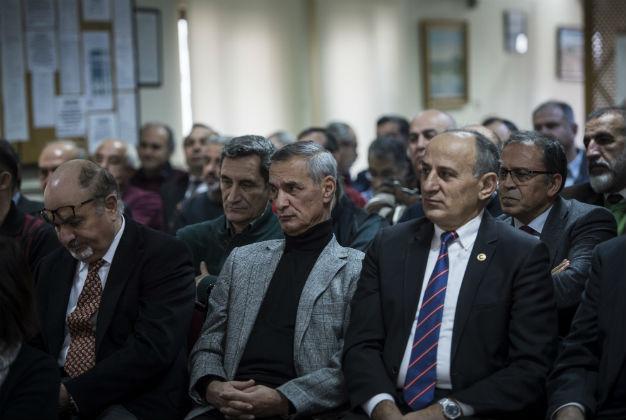
AA photo
Ayhan Taş, a retired lieutenant general who was arrested on Feb. 11, 2011 in the Balyoz case, won his case to receive 1.2 million Turkish Liras in compensation for the prison time he served during his three years under arrest. An Ankara court on Nov. 5, 2015, ruled that Alan to be paid 1.2 million liras as he had been “insulted and his moral values were disregarded” during his arrest.
Engin Alan, a retired lieutenant general and former deputy of the Nationalist Movement Party (MHP), won 1.3 million liras in non-pecuniary damages on Dec. 1, 2015, in a case filed for unfair time served in prison.
Doğan News Agency reported on Dec. 20 that an Ankara court ruled that Yusuf Kelleli, a retired colonel convicted in the same case, was to be paid 1.5 million liras.
10) The Edirne Synagogue reopens after rebuilt
The Great Synagogue in the northwestern province of Edirne reopened on March 26 after four years of restoration.
But the historical synagogue became the subject of an outcry after Edirne Gov. Dursun Şahin threatened to turn it into a museum to punish Turkish Jews for Israel’s actions in Gaza.
The Europe’s second-largest synagogue was transferred to the local Thracian University to be used as a museum after its restoration, but criticism from the Jewish community in Turkey, it was handed back to the General Directorate for Foundations
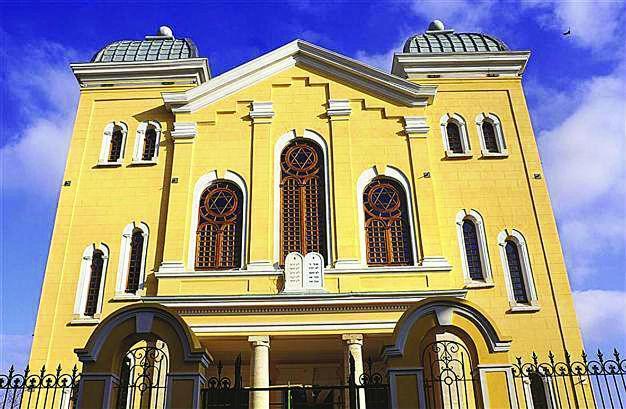
11) Bones found buried at Dersim massacre site
Bone fragments of 24 people have been found during an excavation in the eastern province of Tunceli, thought to be victims killed in the Dersim massacre of 1938.
A local court ruled to start excavations in the Karabayır village of Tunceli to determine whether 24 people were buried there in a mass grave, as claimed by their relatives.
In Dersim, now known as Tunceli, over 13,000 people were killed during a military operation to quash a tribal rebellion during the single-party era. Seyid Rıza, the leader of the rebellion, was executed in 1937.
